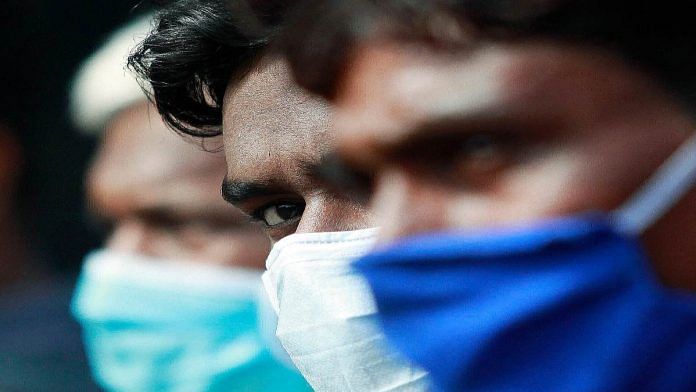New Delhi: The National Centre for Disease Control (NCDC) is set to launch a population-level serological survey in Delhi to assess the actual spread of Covid-19, with the capital’s positivity rate constantly hovering at high rates, ThePrint has learnt.
Positivity rate conveys the share of people testing positive among those tested. Delhi’s average sample positivity rates for Covid-19 have hovered around 25 per cent for several weeks now, crossing 70 per cent in some districts. For comparison, India’s positivity rate has been recorded at 7.77 per cent between 5 and 18 June.
A serological survey involves collection of blood samples to check for the presence of antibodies formed in response to an infection, in this case SARS-CoV-2. Even after a person has recovered, the antibodies that are formed when an antigen (a foreign agent that can potentially cause a disease) enters the body remain, showing that there is a history of infection. The survey is aimed at gauging the capital’s exact exposure to the virus.
Sources in the NCDC, India’s apex organisation for monitoring infectious diseases overseen by the Union health ministry, said about 20,000 people will be tested across Delhi’s 11 districts as part of the survey.
“Positivity rates have been very high in Delhi. There are some situations in which positivity does go up — low testing is one. Positivity also goes up when all the tests are done on people who have been reached through contact-tracing etc,” a senior NCDC official explained.
“But even budgeting for that, the positivity rates are way too high in Delhi and there are high chances of cases being missed at these rates. That is why we are doing a sero survey. We will do a sampling for the entire population, so about 20,000 people will be covered,” the official added.
Delhi has a population of about 2 crore. During the June 7-13 week, district-wise positivity figures for Delhi touched very high levels — 75.4 per cent in Shahdara, 63.4 per cent in Southeast Delhi, 57.1 per cent in Northeast Delhi, 45 per cent in East Delhi, 44.1 per cent each in West and Northwest Delhi, 39.2 per cent in North Delhi, 34.9 per cent in SouthWest, 34.2 per cent in Central Delhi, 27.6 per cent in South Delhi, and 22.3 per cent in New Delhi.
Also Read: L-G bars home quarantine in Delhi for first 5 days after Covid diagnosis, AAP cries foul
Covid-19 in the capital
Earlier this month, the Indian Council of Medical Research (ICMR) released the results of the first phase of its serological survey on Covid-19. As part of the exercise, the ICMR collected data from 26,400 people across 69 districts.
After analysis of data from 65 districts, it found that 0.73 per cent people in these districts had been exposed to the virus until 30 April. The NCDC survey, which is going to have a far bigger sample size relative to the total population that it is attempting to assess, is expected to deepen understanding about the spread of the virus in the national capital.
It will also answer the crucial question about community transmission. So far, the central government’s position is that there is no community transmission in Delhi. It is still a “large cluster amenable to containment” where there is significant local transmission. Delhi Health Minister Satyendar Jain, however, had said on 9 June that the source of infection is not known for about half the cases in Delhi.
While the ICMR survey in itself showed low levels of exposure, it is also a fact that the 0.73 per cent figure suggested a very high number of undetected cases. On 30 April, there were 33,610 cases in the country. The districts in question have population figures that, even if conservatively believed, suggest the actual numbers could be several times higher than currently recorded.
The second phase of the survey was done in containment zones. Those results are awaited.
Covid-19 is the latest addition in the list of 33 communicable diseases that NCDC normally tracks and traces.
While antibodies do help gauge the history of infection, their potential to give continued immunity against re-infection varies with diseases. For chicken pox and chikungunya, the immunity lasts a lifetime. For dengue, it does not. The jury is still out on Covid-19, although cases of re-infection are being reported from several countries. Some have also been reported from Tamil Nadu. A recent study in Nature Medicine reported that for Covid-19, the antibodies do not last more than two-three months.
Also Read: Antibodies in Covid recovered patients last only 2-3 months, finds Nature study



